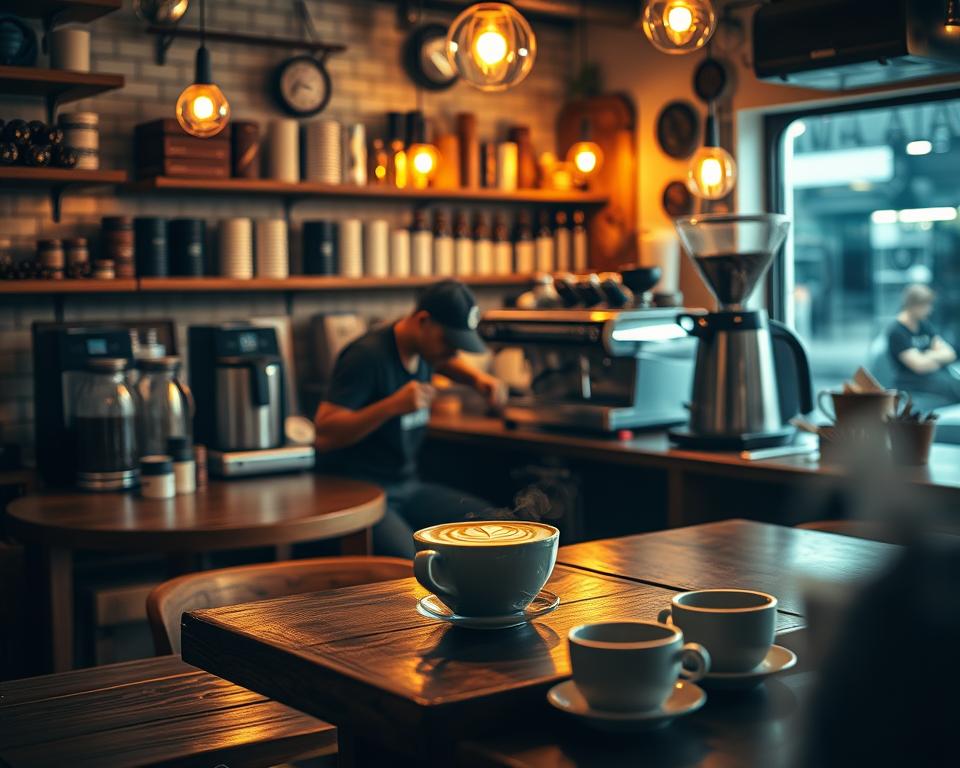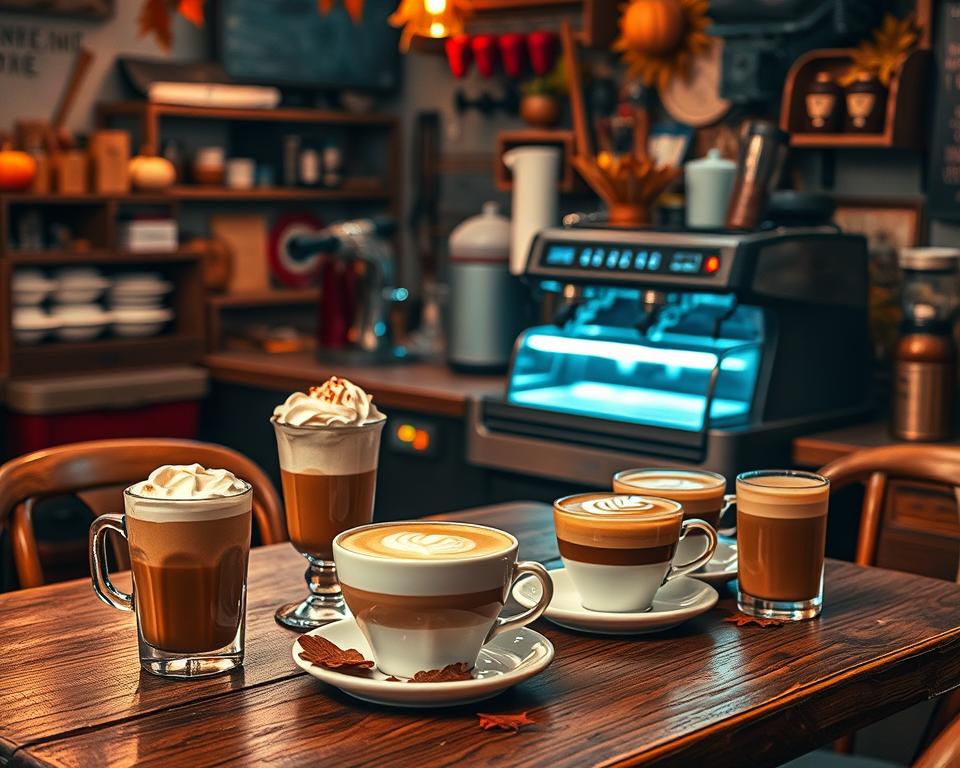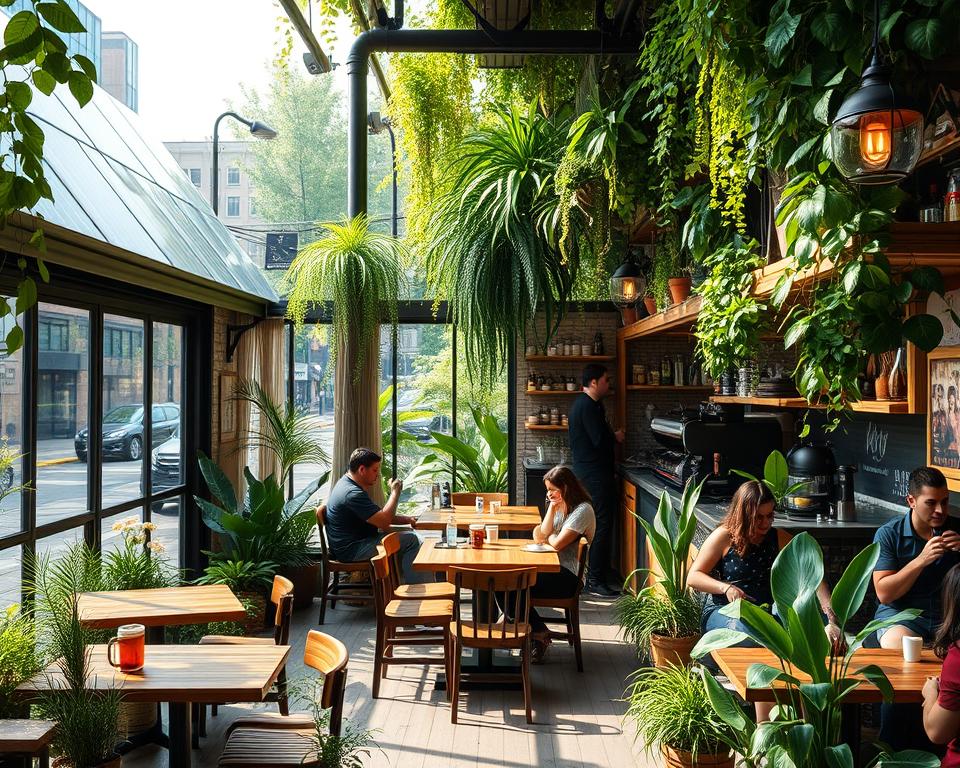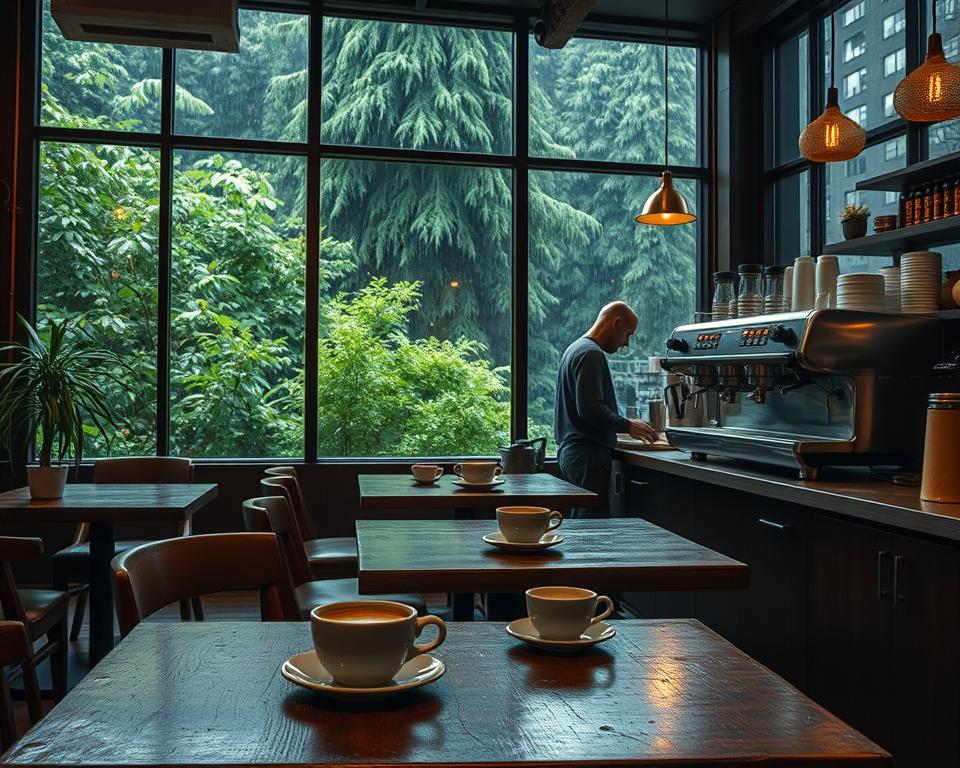Have you ever wondered about the person who makes your coffee every morning? I took a deep dive into the lives of baristas, uncovering their stories and passions. Their tales show a deep love for coffee and a desire to create a welcoming space for everyone.
Baristas, whether they’re just starting or have years of experience, each bring their own flair. It’s amazing to see how they help build community spots for coffee enthusiasts. Through interviews, we see the hard work needed to shine in this key role, making our coffee experiences special.
The Role of a Barista in Today’s Coffee Culture
Skilled baristas are key in today’s coffee world. They do more than just make coffee; they create memorable experiences. They share their coffee knowledge and help build a sense of community.
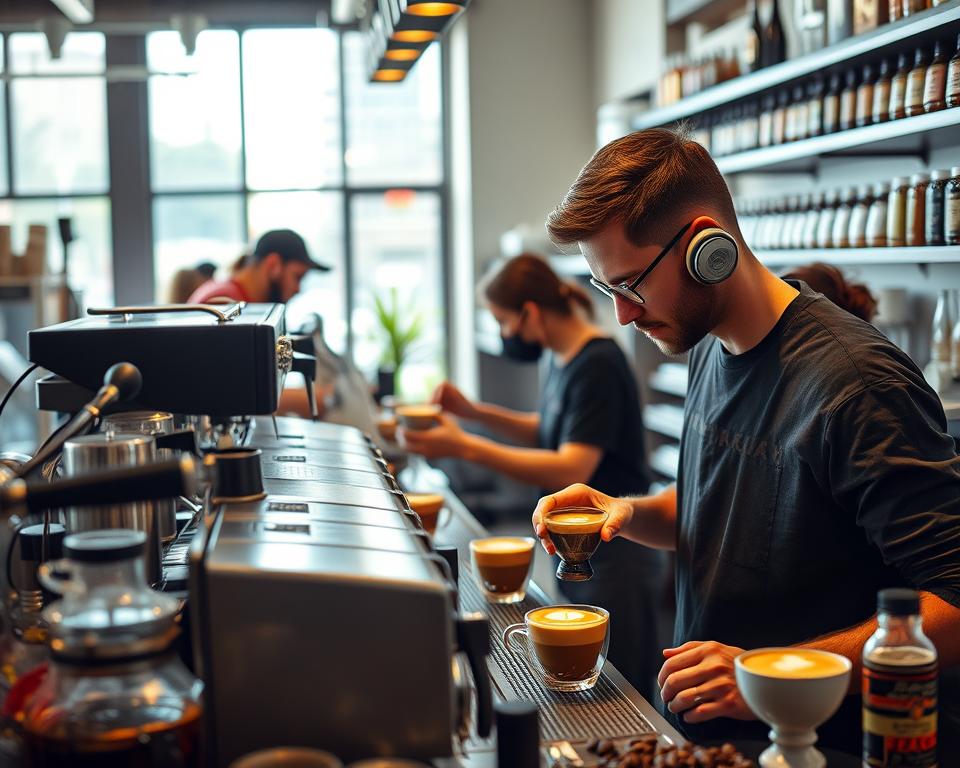
The Importance of Coffee Knowledge
Baristas need a deep understanding of coffee to shine in their roles. They learn about different coffee beans and master many brewing methods. By knowing so much, they help customers explore various tastes and enjoy their coffee more.
Nicholas Senyondo, with 12 years of coffee expertise, stands out. He started at Endiro Coffee in Uganda, where he chose coffees carefully. His process includes visiting roasters and testing coffees. It shows how much baristas need to learn to excel.
Creating Community Hubs
Coffee shops are important for more than just coffee. They’re places where culture thrives and communities grow. Baristas make these spaces welcoming, encouraging people to connect or wind down.
Baristas are crucial in making coffee shops social spots. They work on making everyone feel safe and welcome. By learning how to handle various situations, they keep the cafe an inviting place for everyone.
Matt Powers from Calioh Coffee says staffing is key during busy times. An extra person can help make sure each customer feels taken care of. This helps the coffee shop run smoothly and keeps the community feeling strong.
For more on how coffee shops build community, check out this coffee education guide. It’s full of tips on adding new flavors and techniques to your coffee routine.
Skills and Traits of Successful Baristas
Being a barista is more than making great coffee. It’s about using your skills to make people’s visits special. Even during busy times or slow mornings, they keep things efficient. This keeps the coffee shop running well.
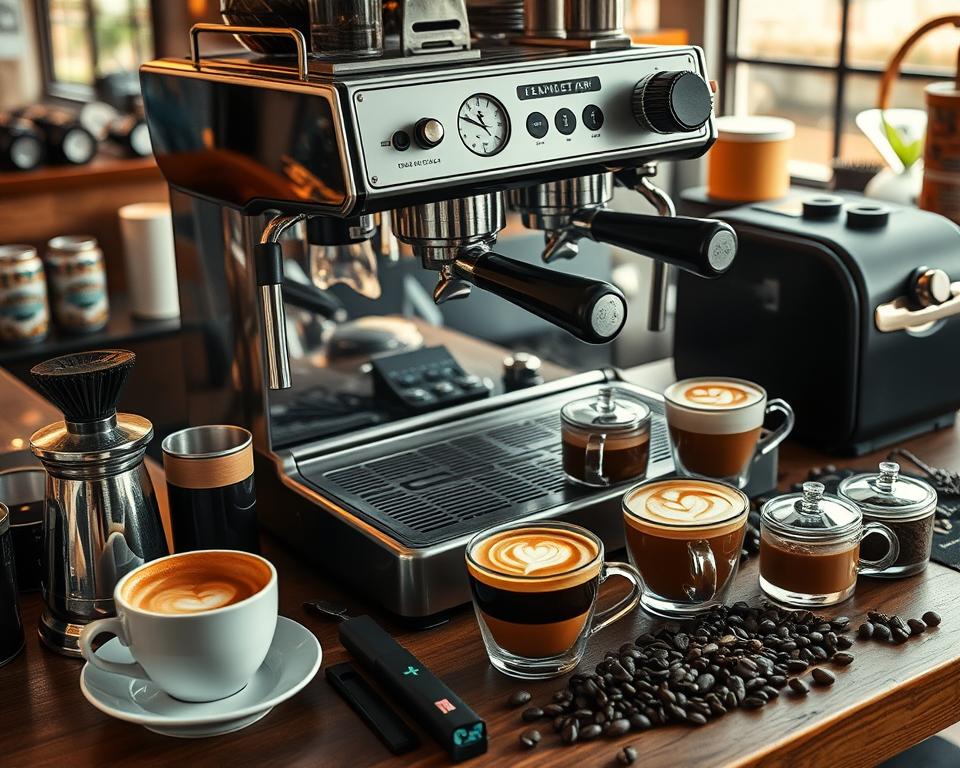
Technical Expertise vs. Cultural Fit
For a barista, knowing how to make coffee and fitting in are both key. They need to master brewing, know recipes, and make beautiful latte art. But, being part of the shop’s culture is just as crucial. A barista who matches the shop’s values does better and helps everyone work together better.
Communication and Empathy
Talking well and understanding others are critical for serving customers and working with the team. Baristas meet many people each day and need to listen and speak clearly. Being friendly and understanding can brighten a customer’s day. It also creates a strong team atmosphere. These skills help baristas handle busy times smoothly and keep the coffee quality high.
Handling Stress and Busy Shifts
Busy times in a coffee shop mean stress is inevitable. Managing stress well helps baristas keep up with high-quality service when it’s busy. They use good organization, do many things at once, and stay calm. This way, they can serve everyone quickly and help their teammates too.
About 47% of a barista’s job is making coffee, and 23% is serving customers. These numbers show that baristas need good technical and social skills. These are vital for doing well in this job.
Coffee Shop Interviews: A Behind-the-Scenes Look
Every day in a coffee shop is a new adventure. Unique barista experiences start from the early morning. The aroma of freshly brewed coffee fills the air, creating a welcoming atmosphere. By the evening, after the last customer leaves, you’ve witnessed a day full of fascinating moments. These behind-the-scenes activities show what makes a coffee shop beloved by many.
Kitsch Cafe is a great example of dedication. It was founded by Jacqueline Mearman in 2020 during the pandemic. Jacqueline put in over $30,000 of her own money into the cafe. This shows her big commitment. Kitsch Cafe also gives back 1% of its profits to the community. This practice shows a strong desire to help others, common in many coffee shops.
Emilie Stack, only 19, started Emilie’s Coffee House & Wine Bar in Cleveland. She uses local resources, like coffee beans from local roasters. A local woodworker made the bar and tables. These choices show the value of supporting local businesses. This theme is seen in coffee shops across the country.
Customer interactions are key to a coffee shop’s success. At Emilie’s, the goal is to make everyone feel welcome. This builds community ties and keeps customers coming back. Jacqueline of Kitsch Cafe also focuses on her team. She helps them grow within the company. This way, many have moved up to better positions.
For more details, check this coffee shop interview guide. It provides more insight into barista experiences. Also, see how different coffee methods are important to a barista’s work.
Mad Nice Goods in Detroit focuses on quality coffee. They use specialized equipment like the La Marzocco Linea PB espresso machine from Coffeehaus. Customer satisfaction here is high. It shows that focusing on details in daily operations is effective.
The coffee world is vibrant and inspiring. Stories from Kitsch Cafe, Emilie’s Coffee House, and Mad Nice Goods show this. They offer a glimpse into the special efforts behind each cup of coffee.
The Challenges of Staffing in Small Coffee Shops
Running a small coffee shop comes with its own set of challenges, especially in staffing. Turnover rates are high, around 60% annually. This is a big issue for café owners.
High turnover affects how the shop runs every day. It also makes labor costs go up, which impacts the budget.
Budgeting Concerns for Café Owners
To keep a café running, managing money well is key. If labor costs are too high, profits can decrease. Café owners need to make sure they have enough staff without spending too much.
Creating rewards like an “Employee of the Month” can make staff happier. This might even help keep them around longer.
Strategies for Cost-Efficient Scheduling
Making a good schedule is important for keeping costs down. It’s important that workers feel important and aren’t too tired. Using job boards such as Indeed, Monster, and Craigslist can help find more staff. This makes coping with staff shortages easier.
Safety Measures for Solo Workers
Safety is very important, especially for those working alone in small coffee shops. Adding security cameras and having clear safety plans can lower risks. Keeping workers safe helps make a better place to work and keeps staff longer.
How Can Unique Café Experiences Enhance My Interviews with Local Baristas?
Visiting unique cafés can elevate your interviews with local baristas by creating a relaxed atmosphere that encourages open conversation. As you sip their signature brews, you can learn about their passion and techniques. Exploring these spaces allows you to immerse yourself in the community and truly discover the best cafés in town.
Passion for Coffee: A Common Trait
There’s something truly remarkable about the passion baristas have for coffee. They take great care in making each espresso or latte. Their enthusiasm is clear in every cup. This love for coffee pushes them to keep improving their skills.
They try new ways to brew and always aim for the best quality. This makes going to a coffee shop a special treat for customers.
Baristas’ Love for Coffee Craft
The love for coffee goes beyond just taste. It’s about the whole process. Baristas, like those at Blue Bottle Coffee, enjoy the precision needed for the perfect cup.
They choose the best beans and master the brewing process. Their passion shows as they keep up with the latest coffee trends. This includes the rise of cold brew, loved by many for its smooth taste.
The Joy of Serving the Community
Baristas find great joy in the social side of their job, too. They love chatting with customers and making everyone feel welcome. Research says 80% of customers think great service is key. Also, 75% like coffee shops involved in their community.
This happiness in serving others shows in every friendly chat. Every coffee made is an opportunity to connect. It makes people feel at home and adds to the rich coffee culture.
Interested in the latest in coffee culture? Check out this article on café hopping. See how baristas help create vibrant coffee communities.
FAQ
What kind of insights can I gain from barista interviews?
From barista interviews, you’ll learn a lot about coffee culture and local spots. You’ll hear stories of their passion and experiences. These stories show their love for the craft of coffee making.
How important is coffee knowledge for baristas?
For baristas, knowing about coffee is key. They share their deep coffee knowledge with customers. This makes the coffee experience better and keeps customers coming back.
How do baristas help create community hubs?
Baristas are key in making coffee shops warm and welcoming. They build connections among customers. And they help the shop play a big part in the community.
What skills and traits are essential for successful baristas?
Successful baristas are good at many things. They need to know about coffee and work well with others. They also need to handle stress and busy times smoothly.
How do baristas handle the stress and busy shifts?
Baristas are good at managing stress and busy times. They keep the coffee shop running well. They make sure customers get great service, even when it’s really busy.
What do barista interviews reveal about day-to-day operations?
Barista interviews give us a peek into coffee shops’ daily life. You learn about their experiences and customer dealings. They show the reality of running a coffee shop.
How do small coffee shop owners handle budgeting concerns?
Owners of small coffee shops watch their budgets closely. They plan their spending smartly and invest in good equipment. This helps them give great service and keep their staff safe.
What strategies can small coffee shops use for cost-efficient scheduling?
For cost-efficient scheduling, small shops plan carefully. They may have staggered shifts and train employees in multiple roles. This helps them handle busy times without going over budget.
How do small coffee shops ensure the safety of solo workers?
To keep solo workers safe, small shops have strong safety rules. They train staff well and give them the tools they need. This way, everyone stays safe, even when alone.
What drives baristas’ passion for their craft?
Baristas are passionate about coffee and perfecting their craft. They love making drinks and serving the community. This passion is what makes them great at their job.
How does serving the community bring joy to baristas?
Serving the community makes baristas happy. They enjoy making great coffee and seeing customers happy. Building personal connections with customers is rewarding for them. It makes the coffee experience better for everyone.

